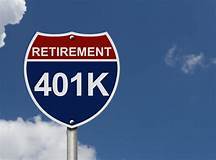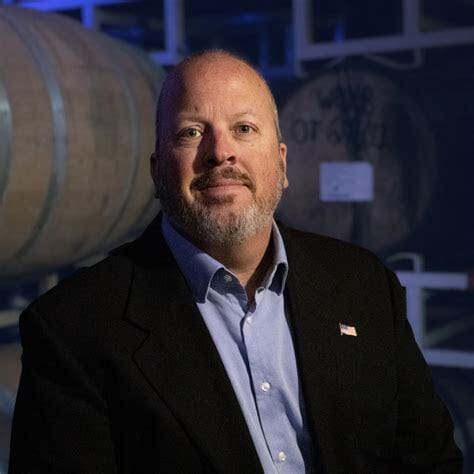- Retirement Examined
- Posts
- Retirement Examined - New Seminar Coming Soon!
Retirement Examined - New Seminar Coming Soon!
5-Minutes of Breakthrough Secrets: Happy, Fulfilling Retirement

The weekly email that keeps you up to date on exciting Retirement topics in an enjoyable, entertaining way for free.

Novus Financial Group is in the process of scheduling its second seminar of 2024. The topic of the seminar is Beating Inflation By Investing in Real Assets (Precious Metals & Our Own Private Equity Offering of Bourbon) and our special guest speaker Andrew Newby, CEO of The Bourbon Reserve. (https://www.bourbon.fund). The seminar will be held in Columbus, OH. Stay tuned for more information on the agenda and how you can reserve your seat(s). Dates will be announced soon!
401k’s Are Failing Workers

by Eric Seyboldt
Warnings are coming from every direction about a potential crisis lurking in our pension system. Analysts across the board argue that the swelling retiree population could tip the balance against the Social Security scheme, necessitating urgent financial reinforcements.
Yet, a more insidious crisis looms with the gradual exit of the workforce in an age where the emphasis has shifted to individual contribution plans, like 401(k)s, nudging aside traditional defined-benefit pensions. Researchers have unveiled alarming insights into the American retirement landscape, revealing a grim preparedness level for retirement, profoundly exacerbated by the replacement of pensions with 401(k)-style plans.
The Economic Policy Institute’s Monique Morrissey has thrown considerable light on this issue, employing 32 elucidative charts to depict a daunting scenario for American retirees. Morrissey delved into the Federal Reserve Survey of Consumer Finances, focusing on family heads aged between 32 and 61, to evaluate the three decades leading to the minimum Social Security retirement age of 62. Her findings underscore significant inequalities sparked by the pivot from pensions to 401(k) arrangements.
Since the millennium’s onset, there's been little to no growth in the retirement savings for a broad segment of the American populace. In 2022, the average savings in 401(k) or IRA plans were $112,000, a minor step up from $91,243 in 2001, hardly filling the void left by the vanishing defined-benefit pensions. However, these averages, skewed by high-end savers, mask the grim reality.
A staggering half of working-age households haven't saved anything for retirement. The median savings for those aged 55 to 64 stand at a meager $71,176, with the wealthiest 10% saving at least $1,290,000, leaving the bottom half virtually empty-handed. "We're heading towards a retirement framework that amplifies rather than merely mirrors inequality," remarked Morrissey.
This disparity wasn’t as pronounced in the past. Pensions were more widely held across income groups and were more equitable between white and black workers, although Hispanics have historically been disadvantaged.
The shift towards 401(k) plans has disproportionately affected lower-income Americans, who often work in jobs without 401(k) options. The burden of financial planning has shifted onto employees, leaving the financially disadvantaged struggling to contribute to their retirement funds. The intricacies of 401(k) schemes further complicate matters, as opposed to the simplicity offered by having pensions managed by professionals.
Consequently, families with higher incomes are tenfold more likely to have retirement savings than those with lower incomes. The majority of African-Americans and Hispanics do not possess retirement savings, and those who do, have considerably less. Those without a college degree largely lack retirement savings, with 82% of individuals without a high school diploma falling into this category. Also, single individuals display a lower propensity to hold retirement accounts.
Analyzing retirees through Census data, Morrissey notes that, even 25 years after 401(k)s rose in prominence, pension plans are still a critical income source, notably among African-American and female retirees who disproportionately occupy public-sector jobs offering defined benefits.
The inception of the 401(k) revolution coincided with cuts to Social Security benefits following legislation in 1983 that raised the retirement age, at a time when wages began to lag behind productivity leading to a shrinking labor income share.
"The transition to a 401(k) regime couldn't have occurred at a more inopportune time," stated Morrissey. However, given their profitability to Wall Street through higher fees compared to traditional pensions, a full-scale return to pension plans seems improbable.
Thus, two foundational supports of the retirement security structure have been systematically dismantled. Stagnant wages and the replacement of pensions with 401(k) plans, which were initially considered supplementary, have eroded Americans' savings for their later years. Morrissey observed that the initial role of 401(k)s was never to be a complete substitute for pensions, underscoring why their efficacy is lacking.
According to Morrissey, bolstering Social Security, the remaining pillar of retirement security, is imperative. Social Security is a vital lifeline for retirees across different demographic slices, especially for those with lower incomes, often representing their sole source of income.
Morrissey also proposes holding off on any pension cuts, highlighting the ongoing critical role of public-sector benefits compared to 401(k) plans even amid potential challenges in expanding Social Security in the short term.
The current trajectory leaves many Americans starkly unprepared for retirement. The 401(k) model, an accidental evolution never intended to fully secure worker retirements, inherently burdens individuals without the means to bear it. Pushing retirees towards poverty and stripping their dignity in their twilight years is an urgent issue that demands immediate action.
Contact us to schedule a free, 10-minute consultation call. Together, we can discover ways to enhance your retirement income, making sure your later years are as joyful and carefree as you've envisioned. Drop us an email or call us now to book your consultation. Let's turn your retirement aspirations into reality!
TIP OF THE WEEK
Create Wealth & A Family Legacy By “Building A Family Bank”

by Eric Seyboldt
In a time where financial trends come and go with speed, the idea of creating a family bank shines as a pillar of wisdom for those aiming not just to gather wealth for their later years, but to establish a durable legacy for their descendants. This method, promoted by economic experts like Doug Andrews, lays out a thoughtful plan for accumulating and safeguarding wealth across generations.
Understanding the Concept of a Family Bank
Essentially, a family bank isn't a literal bank, but rather a symbolic idea that relies on the disciplined approaches to saving, investing, and smart management of familial wealth. It's about forming a financial environment in which assets are nurtured, shielded, and eventually handed down, securing the financial well-being of future generations.
Step 1: Setting the Foundation
The initial step toward creating a family bank involves adopting a long-view approach to wealth. This strategy focuses on investments known for their stability and potential for growth over time, including diversified financial portfolios, property investments, and life insurance policies. Mark McCanney, of Novus Financial Group (Columbus, Ohio) points out life insurance as a flexible tool for wealth transition and as a fundamental element of the family bank.
Step 2: Enhancing Financial Knowledge
The success of a family bank leans heavily on the shared financial savvy of its members. Committing to educate all family members on financial matters, from elementary budgeting techniques to advanced investment tactics, is crucial. This collective wisdom enhances the family's capability to make well-informed decisions and to adeptly manage wealth complexities as a unit.
Step 3: Implementing Governance
For a family bank to operate smoothly, establishing transparent governance practices to oversee its functions and smooth out disputes is necessary. This involves organizing regular familial gatherings to deliberate on financial objectives, evaluate investment yields, and reach decisions together. Creating a family constitution could also prove useful, detailing the norms and rules that guide the family's economic activities.
Step 4: Committing to Philanthropy
Incorporating philanthropic efforts into the family bank's strategy not only contributes positively to the community but also cultivates a spirit of responsibility and kindness among younger family members. It highlights the significance of giving back and solidifies a family legacy that extends beyond just wealth.
In summary, forming a family bank is a powerful approach for those desiring to safeguard their future comfort and fashion an enduring legacy. By adhering to these outlined steps and seeking insights from authorities like Mark McCanney, investors can establish a platform for wealth that benefits generations to come, transcending mere financial success.
Reach out to us for a complimentary, 10-minute consultation call. Let's explore together how we can help you build your “family bank”, ensuring your lasting legacy. Email us or give us a call today to schedule your consultation. Let's make your retirement dreams a reality!

Fixed annuities can be an essential component of a well-rounded retirement strategy, offering security, predictability, and efficiency in financial planning.
Here are current fixed annuity rates and their durations from Top A-rated carriers (subject to change at any time, not FDIC insured):
3-year: 5.40% to 5.70% (depends on size of initial deposit)
5-year: 5.85% to 6.15% (depends on size of initial deposit)
Please feel free to email Eric at [email protected] if you’d like to ask any questions or request information on these fixed annuities or other retirement topics that are on your mind.

“Never be bullied into silence. Never allow yourself to be made a victim. Accept no one’s definition of your life; define yourself.”
REAL ASSETS, Invest Like the Wealthy to Become Wealthy

www.bourbon.fund
How Do We Outperform The Ridiculous Level Of Inflation?
If, like many Americans, you’re looking for ways to diversify and protect your retirement savings against economic and geopolitical uncertainty this year, we have some answers for you.
In the face of numerous challenges ranging from debt ceiling anxieties, soaring inflation, elevated interest rates, extensive governmental expenditure, and depreciation of the dollar, to the generally volatile markets, we find ourselves in an unprecedented dilemma.
An increasingly preferred method for safeguarding investments is to spread some of the assets within an IRA or 401(k) across physical entities that are experiencing unprecedented demand, such as Gold or Bourbon barrels.
Allocating funds into the asset class known as “Real Assets” may be a strategy that you should consider.
Ask us how to Rollover a portion of Your IRA or 401k To A GOLD IRA (link below) or a BOURBON IRA (www.bourbon.fund/how-it-works/) and:
Safeguard your assets from the collapsing dollar
Incorporate the ‘REAL ASSET’ class into your portfolio like the ultra-wealthy
Hedge against the current high-inflation conditions
Protect your retirement assets against economic crises
Just get in touch. We make it easier than ever.
CONNECT WITH US

Eric Seyboldt, MBA

Mark McCanney
Feedback or Questions?
You’re invited to get in touch with us if you’d like to find out how the Novus Financial Group can help you on your journey to a happy, fulfilling life in Retirement.
We have a lot of great information, as well as podcasts from our radio show ‘The Financial Insider’, and tools on our website - www.novusfg.com.
Office: 614-943-2265
Feel Free To Forward Retirement Examined To A Friend and Have Them Subscribe By Clicking The Button Below:
Reach out if you’d like to advertise your business on Retirement Examined or would like to be a sponsor.
Investment advisory services are offered by duly registered individuals on behalf of CreativeOne Wealth, LLC a Registered Investment Adviser. CreativeOne Wealth, LLC and Novus Financial Group are unaffiliated entities.
The content we provide here isn’t financial advice and cannot be taken as such. Please speak to your financial advisor before making any investment decision. Also, note that every investment comes with its risks and drawbacks. Lastly, we would like to remind you that past results cannot guarantee future returns.
This website contains one affiliate link. When you click on the link and make a purchase, we may receive a commission at no additional cost to you. We only promote companies that we have personally used or researched and believe will add value to our readers.
